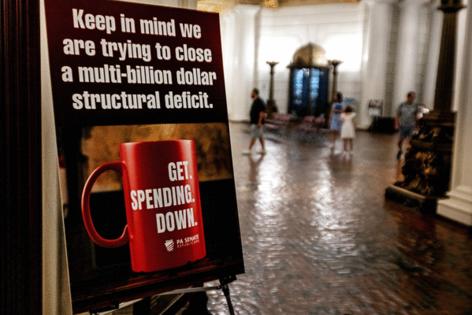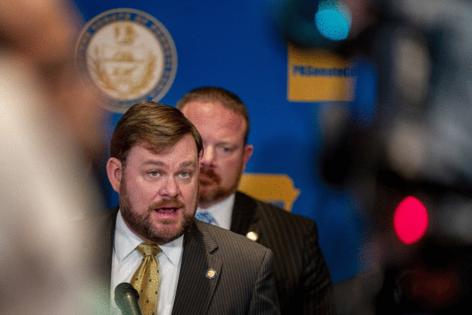Pennsylvania's state budget is nearly three months late. Leaders still can't agree on the basics
Published in News & Features
HARRISBURG, Pa. — Despite the contentious issue of mass transit funding being off the table, top Pennsylvania legislative leaders are still unable to agree on the most basic question when it comes to state budget negotiations: how much money they should spend.
The state’s cooling financial outlook — plus federal uncertainty and required increases to Medicaid spending — has leaders still at odds and growing increasingly frustrated over how much state money they should budget for the new fiscal year, which began more than 2½ months ago and has left state payments to essential services in limbo.
What’s more: The amount lawmakers ultimately approve for this year’s budget will determine if Pennsylvania needs to raise taxes, cut spending, or create new revenue streams next year, as the state is set to spend more than it brings in during this budget cycle and every following year without new income.
If leaders agreed to fund Gov. Josh Shapiro’s budget proposal at his requested $51.5 billion total spending number, the state would spend more than $5 billion than it is projected to bring in for the 2025-26 fiscal year.
The spending divide
The issue of agreeing on the total spending number is a critical part of getting closer to a final budget deal.
Once leaders agree on how much they will spend for the year, they usually work backward to fill in how they plan to allocate the state’s revenue, as well as any policy changes they wish to approve as part of a final deal. According to top leaders in the secretive negotiations, there are other sticking points that remain besides the overall spending number.
But the disagreement over that fundamental piece of the state budget in September, as the impasse persists, reflects the schism within Pennsylvania’s divided legislature that Shapiro recently described as “diametrically opposed.”
Shapiro presented a $51.5 billion budget proposal in February, which suggested the creation of several new revenue streams — such as legalizing recreational-use cannabis and taxing so-called skill games — as well as tapping into the state’s emergency Rainy Day Fund to cover any overages.
However, as the budget stalemate has dragged on, Shapiro and House Majority Leader Matt Bradford (D., Montgomery) have continued to decrease their spending proposals at the closed-door negotiations and publicly, from a House-approved $50.6 billion spending plan passed in July to a $49.9 billion proposal sent to GOP leaders by Shapiro last month. But top Senate GOP leaders say the reductions are still not enough.
“We are getting to the point where, if we don’t start taking steps to mitigate the structural deficit … we’re going to have significant issues in a few years,” Sen. Joe Pittman (R., Indiana), the Senate majority leader, said in an interview Friday.
Top Senate Republicans remain concerned that the state is facing a long-term deficit and maintain that if they do not approach spending conservatively this year and protect the state’s $7.7 billion Rainy Day Fund, tax increases or spending cuts will be required as soon as next fiscal year. Democrats, more broadly, have expressed interest in tapping into the state’s multibillion-dollar Rainy Day Fund, arguing that the state should not sit on funds that could be invested in Pennsylvanians.
Plus, within the GOP, there are internal political dynamics at play: At least two state senators have said they will not support a state budget that goes much higher than last year’s total spending number of $47.6 billion, and Pittman has acknowledged that, no matter what, he likely will not have all 27 GOP members of the 50-person Senate to vote in support of a final budget deal.
Pittman maintains that agreeing upon the total spending number is “only one part of this equation” in negotiating a final budget deal, and that it remains one of several major sticking points in the slow-moving negotiations.
For months, Shapiro has publicly said top lawmakers were “close” to an agreement in their closed-door talks. However, at a news conference Thursday, he seemed increasingly impatient with the Senate GOP, noting that the Senate had only “bothered to come to work 29 days” since he unveiled his budget proposal in early February. A spokesperson for Bradford echoed similar frustrations with the Senate GOP.
“What the Senate of Pennsylvania needs to do now is figure out how they can find 26 votes for a package that can pass in the Senate and also pass in the House,” Shapiro added. “At some point, they gotta show up to work.”
‘Their one job’
Pennsylvania lawmakers are tasked by the state constitution to approve a balanced state budget and send it to the governor’s desk for approval by July 1, the start of the new fiscal year.
Until a state budget is approved by the General Assembly and signed by the governor, the state cannot release funds to schools, counties, and other state-subsidized services that residents rely on. The Philadelphia School District borrowed $1.5 billion earlier this month, largely due to the late state budget. The district estimated it will spend $30 million in interest and fees to take out the loan while lawmakers finalize a state budget. Counties across the state are also considering similar financing options or tax increases in absence of state payments.
“Their one job is to put a budget on my desk,” Shapiro said at the news conference Thursday in Allentown.
Pittman, in response, said Shapiro was “welcome to take potshots all he wants.”
“But the reality is, it’s his job, too,” Pittman added. “We can always evaluate each other’s approach to our work. He’s welcome to have his opinion on how we’ve approached our work in the Senate. I certainly have my opinion on how he’s approached his work as governor, but I choose not to exercise my opinion on that in a public setting.”
Potential revenue streams
Shapiro proposed a number of additional revenue sources as part of his budget address earlier this year, but none have come to fruition. Top Senate GOP leaders have rejected suggestions such as legalizing and taxing recreational marijuana. And lawmakers have so far been unable to agree on how to regulate skill games, the slot-machine look-alikes that have proliferated around the state in gas stations and bars.
However, Pittman said Friday that the removal of mass transit from the negotiation table, and the suggestion of using skill games revenue to fund it, has “relieved a lot of the dialogue” over how Pennsylvania could tax and regulate the machines. Leaders previously viewed skill games revenue as a potential long-term source for mass transit funding.
“I do think that could, in fact, be a source to address in part the structural deficit concerns we see in future budgets,” Pittman said.
As of Shapiro’s February budget address, Pennsylvania also expected to spend an additional $53.1 billion in federal funds, making up approximately 40% of all state funding. But those estimates were made before President Donald Trump’s One Big Beautiful Bill Act was approved by Congress. The Shapiro administration has estimated that cuts in the bill will reduce access for hundreds of thousands of Pennsylvanians to Medicaid and food assistance programs, because the state cannot backfill the future federal cuts.
A national outlier
Pennsylvania is the only state nationwide with a late budget, as of Sept. 4, according to the National Association of State Budget Officers.
Forty-seven states have budgets enacted for the new fiscal year. Michigan, which also has a divided legislature and a Democratic governor, has yet to finalize a state budget for its fiscal year beginning Oct. 1. North Carolina approved a six-month budget earlier this summer.
Pennsylvania spends less per resident than its Democratic-led neighbors, but more than its GOP-led ones, according to an Inquirer analysis.
States across the country projected slowing revenue for the 2025-26 year as the remaining federal COVID-19 relief programs run out, according to a NASBO report reviewing all of the nation’s enacted state budgets. Most states maintained or increased their Rainy Day Funds, which is a priority for Pennsylvania Senate Republicans, Pittman said.
But the late budget is not a surprise, nor is it something new, Pittman said.
Pennsylvania has missed its July 1 budget deadline during Shapiro’s first two state budgets, and leaders often blow past the deadline with little consequence. In 2015, under Democratic Gov. Tom Wolf and a GOP-controlled General Assembly, the budget impasse lasted nine months.
“It’s reflective of how purple of a state we are,” Pittman said.
©2025 The Philadelphia Inquirer, LLC. Visit at inquirer.com. Distributed by Tribune Content Agency, LLC.










Comments